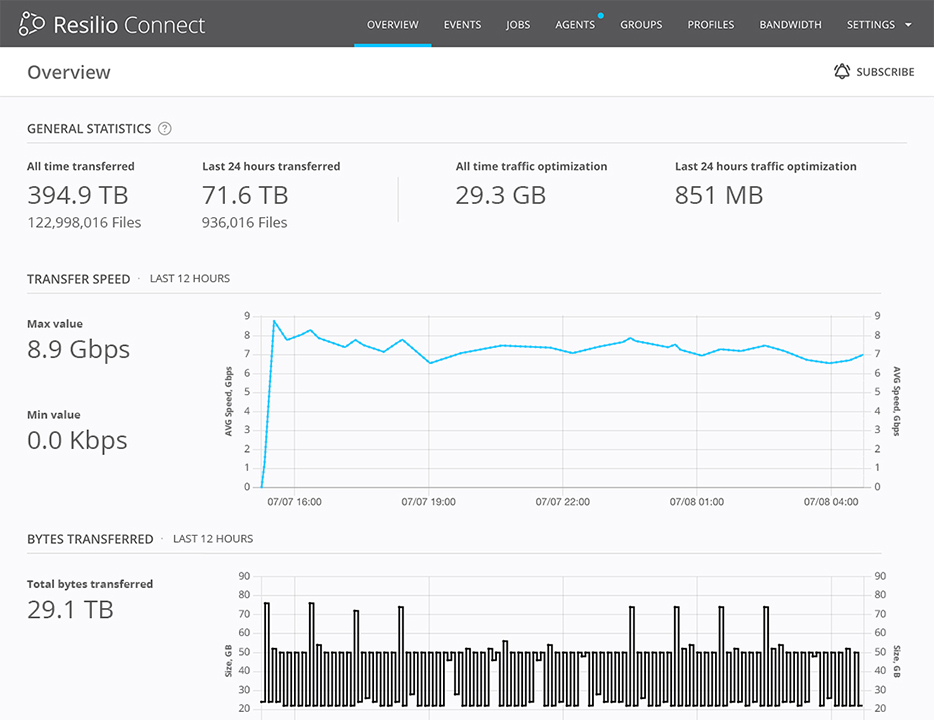Automated file transfers help businesses speed up and simplify many tasks, including transferring files across many branch offices, moving files from on-prem devices to the cloud (or vice versa), backing up data to off-site servers, and more.
There are different types of solutions that can help you automate file transfers, including traditional MFT software, enterprise-level file transfer and synchronization systems (like Resilio Connect), and others. They can be quite different depending on factors like:
- Automation capabilities. Some solutions support only script-based automation, while others also provide different methods that don’t require scripting or writing any code.
- Transfer architecture. Most solutions use standard point-to-point architectures. This makes them a poor choice for distributing files to several locations as quickly as possible and other use cases where data needs to be moved or synchronized reliably and in real-time.
- WAN optimization. WAN (wide area network) acceleration features are essential if you’re planning to transfer files across large distances and unreliable or spotty networks. Without WAN acceleration, you won’t be able to transfer files in reliable timeframes or make the most out of each network.
- Data security. Data should be encrypted both at rest and during the transfer. It’s also good to look for additional security features built into the solution, like granular access control, mutual endpoint authentication, data integrity validation, and more.
- Deployment. The right file transfer solution should be compatible with your existing workflows, devices, storage systems, and any other components of your infrastructure.
In this guide, we’ll look at 7 automated file transfer software solutions, starting with Resilio Connect — our reliable, secure, and scalable software solution for data transfer, replication, and sync.
You can use Resilio to transfer files of any number and size across your on-prem infrastructure, cloud regions, and hybrid cloud environments (our engineers successfully synchronized 450+ million files in a single job by a single agent).
Resilio Connect provides:
- Centralized management and automation. While you can use Resilio with command-line scripts, our solution also provides an easy-to-use graphic interface that gives you centralized control over file transfers at each endpoint in your environment.
- Fast, scalable, and reliable transfer and sync. Resilio’s unique P2P (peer-to-peer) architecture removes single points of failure and allows every device with a Resilio agent to participate in transfers, increasing the speed and guaranteeing reliability. Combined with file chunking, this results in transfer speeds that are 3-10x faster than competing solutions.
- WAN optimization. Our proprietary WAN optimization protocol ensures data is always delivered in predictable time frames regardless of distance, latency, and network quality.
- Versatile deployment options. Resilio is a cloud-agnostic software solution compatible with most device types, operating systems, and cloud storage providers.
- Built-in security. Resilio includes end-to-end encryption and mutual endpoint authentication without the need for additional software.
Once we go over Resilio’s unique advantages, we’ll explore six other options, including IBM Aspera, MASV, and four traditional MFT solutions.
Organizations in gaming, media, retail, tech, and more use Resilio Connect to transfer and sync data across on-premises, cloud, and hybrid cloud environments. To learn more about how Resilio can provide your organization with automated, fast, efficient, secure, data transfer, sync, and access, schedule a demo with our team.
1. Resilio Connect
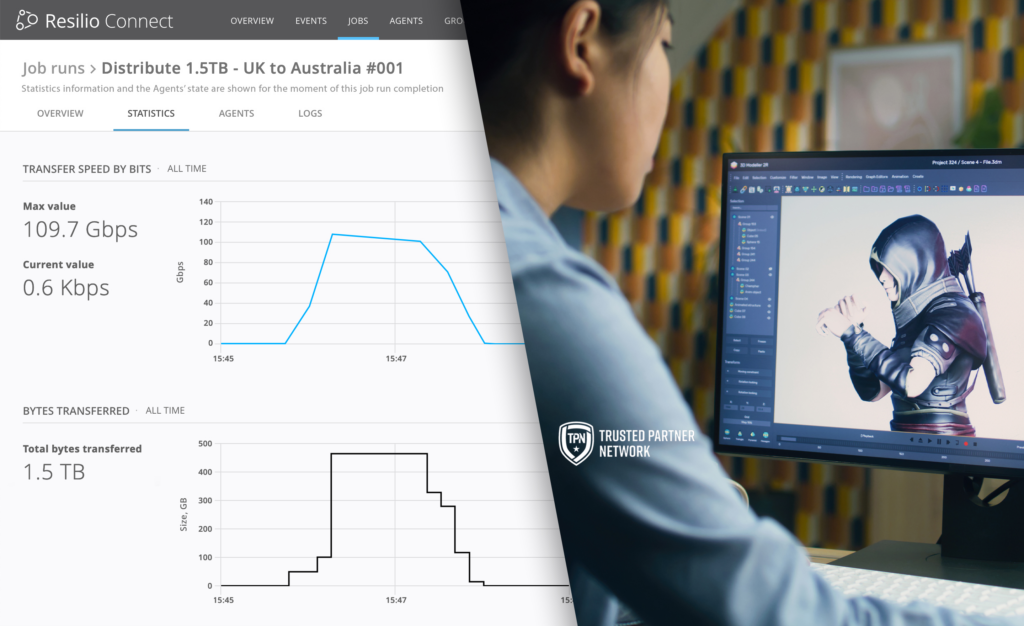
Resilio Connect is a reliable file transfer and synchronization software system. It lets you automate file transfer, sync, and replication jobs across your devices, locations, and storage systems using a Central Management Console and our REST API.
In addition to letting you automate file transfers based on your needs, Resilio is a perfect solution for:
- Simplifying data replication, sync, ingest, transfer, and access by controlling all aspects and parameters from a single place.
- Quickly transferring and syncing large files across many geographically dispersed endpoints (e.g., cloud regions or branch offices). There’s no limit to the size and number of files you can transfer with Resilio.
- Moving large amounts of data from the deep edge into the cloud (or transferring data from the cloud to edge locations) over unreliable networks, like Wi-Fi, VSAT, cell, and broadband. Note: You can learn more about Resilio’s edge ingest capabilities here.
- And many other use cases.
Easy Automation and Centralized Management
Resilio’s intuitive Management Console lets you view, manage, and automate file transfers across all endpoints from one place. It also gives admins granular control over bandwidth allocation and key parameters like disk io threads, file priorities, packet size, and data hashing.
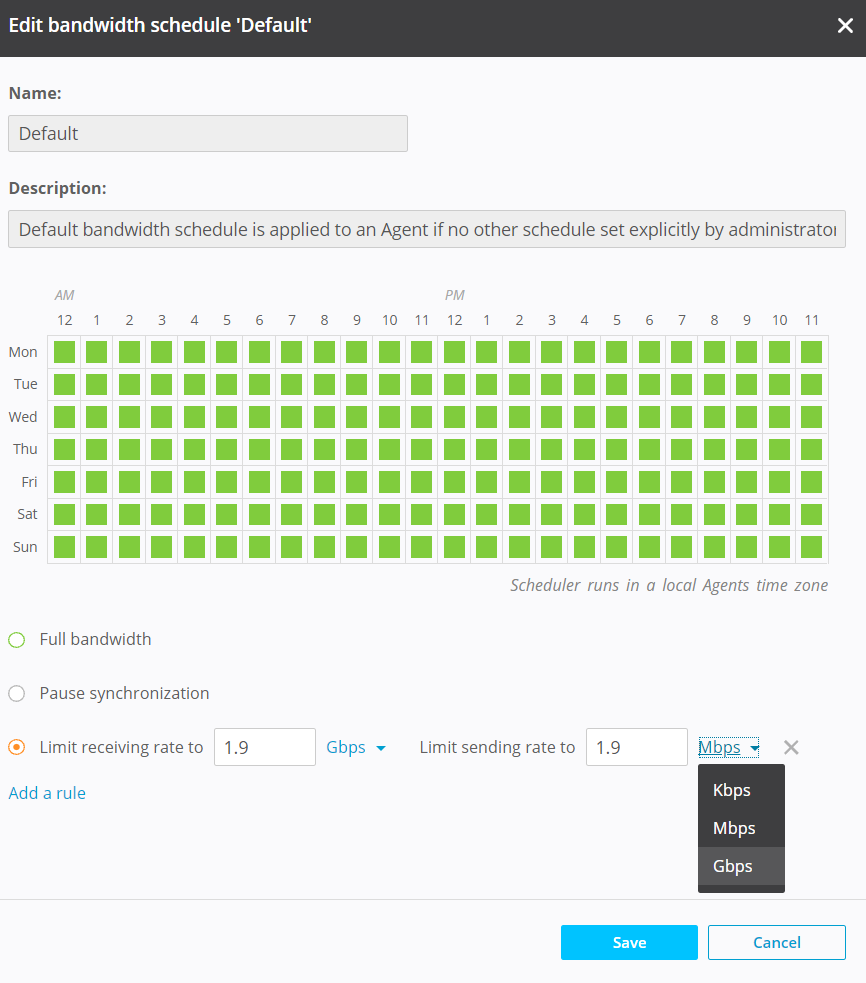
In addition to these workflow automation capabilities, you can use the REST API to easily integrate Resilio with popular solutions that your team is already using to create automated workflows. For example, we have customers who have integrated Resilio with:
- Media tools and creative software, like Adobe Premiere, Avid Pro Tools, and Media Composer.
- Management tools, like Microsoft SCOM, Splunk, and LCE.
- Development tools, like TeamCity and Jenkins.
For example, Wargaming — a global video game company — integrates Resilio with TeamCity and Jenkins. When one of their video game builds is complete, the CI calls Resilio via API to send the file to the DevOps team members located on a different continent.
Lastly, you can use Resilio’s Central Management Console to:
- View audit logs of file transfers to keep track of past jobs and performance.
- View transfer metrics in real-time, monitor job status, and adapt by adjusting parameters on the fly if necessary.
- Check the status of individual endpoints to keep track of file transfer processes and receive early warning of disruptions to file movement.
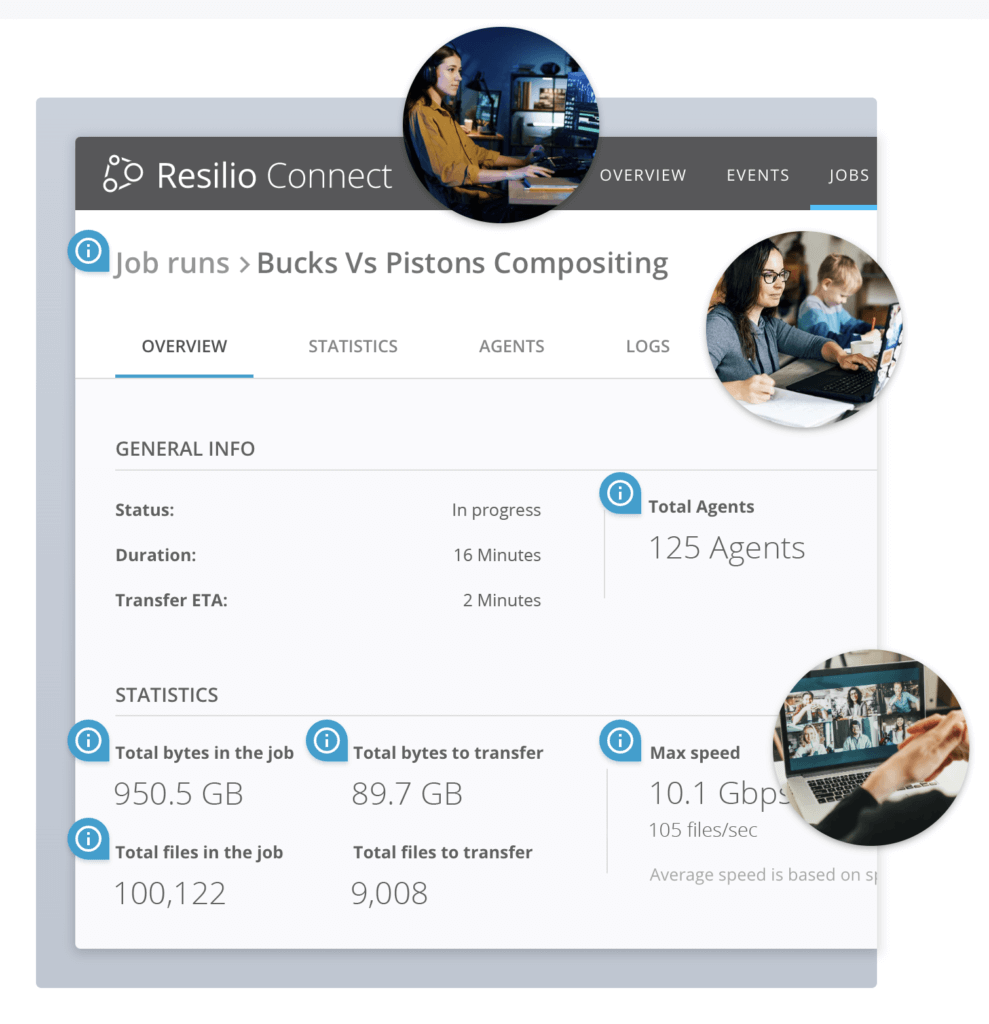
Case Study: Mixhits Radio
MixHits Radio includes a music streaming service with custom playlists of high-fidelity music. To achieve this, they need to synchronize not just the music, but the metadata that includes information like song titles and artists.
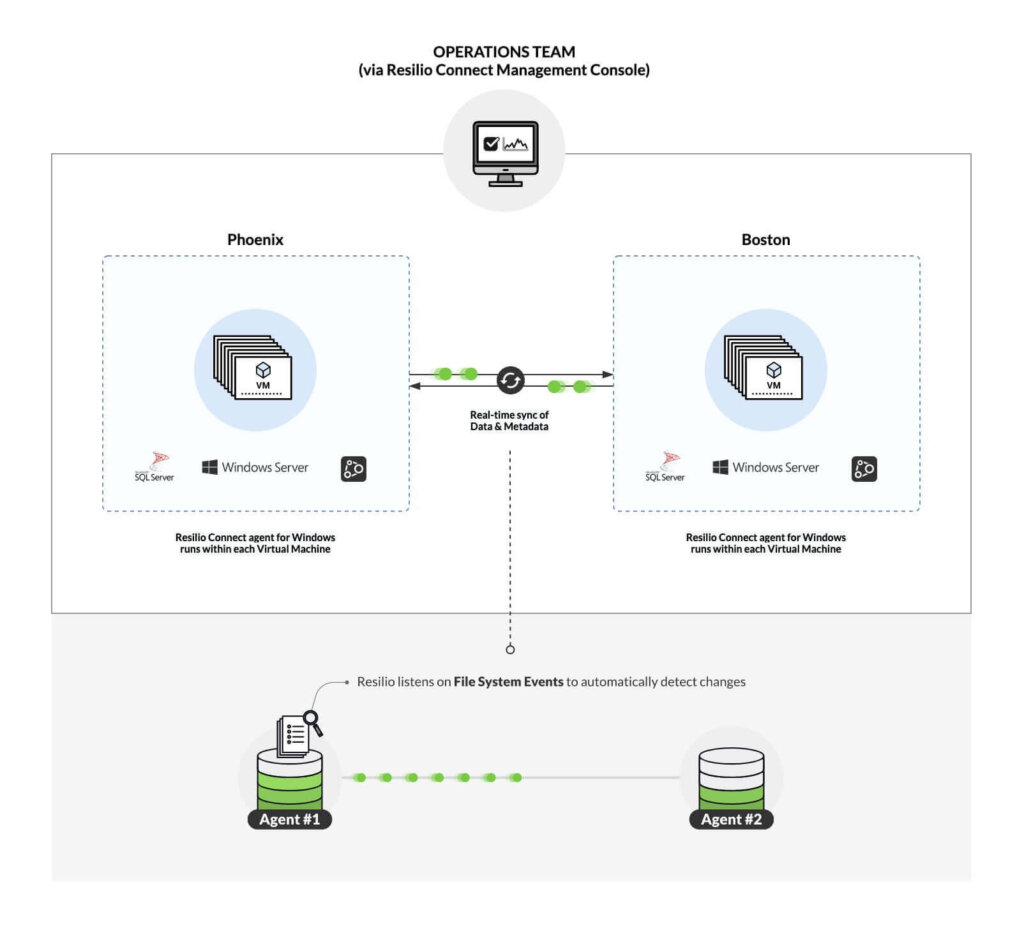
Once Mixhits Radio started using Resilio Connect, they were easily able to sync changes to the cloud, ensure metadata integrity, and generate daily email notifications with job sync status. As a result, they’ve streamlined their business processes by saving 60 hours a month that used to be dedicated to troubleshooting.
Speed, Scalability, and Reliability
As we said, Resilio uses a unique P2P architecture. This is in stark contrast to traditional file transfer and sync solutions that rely on point-to-point replication architectures deployed in one of two models:
- Hub-and-spoke, with onehub server and several remote servers. The remote servers can’t share data directly with each other — they must first move files to the hub, which then replicates them to each remote server one by one.
- Follow-the-sun, where transfers occur in a specific order — e.g.,Server 1 transfers data to Server 2, then Server 2 transfers to Server 3, and so on.
Both of these models suffer from multiple weaknesses that make them unsuitable in many scenarios.
Their transfer speeds are slow since files can only be transferred between two servers at a time. Reliability is also an issue, as there’s always a single point of failure. If one server goes down or is on a slow network, transfers to the entire environment can get delayed. Lastly, these models don’t scale well and can only sync one-way or (at most) bi-directionally.
Resilio’s P2P architecture avoids all these problems. First, every endpoint with a Resilio agent on it can share data directly with any other endpoint. This means all endpoints in your environment can work together to transfer and sync data.

Resilio also uses file chunking to split up files into multiple pieces that can be transferred independently of each other.
For instance, if you want to sync a file across 5 servers, Resilio could split that file into five chunks, with Endpoint 1 sharing the first chunk with Endpoint 2, which shares that chunk with Endpoint 3, even before it receives the remaining chunks, and so on. This enables Resilio to sync environments 3-10x faster than most point-to-point solutions.
In other words, Resilio turns your infrastructure into a distributed mesh network, effectively giving every endpoint the power of a data center. It leverages every endpoint in your environment in order to distribute network and CPU load across your system, reduce the load on your servers and internet channels, and improve data availability.
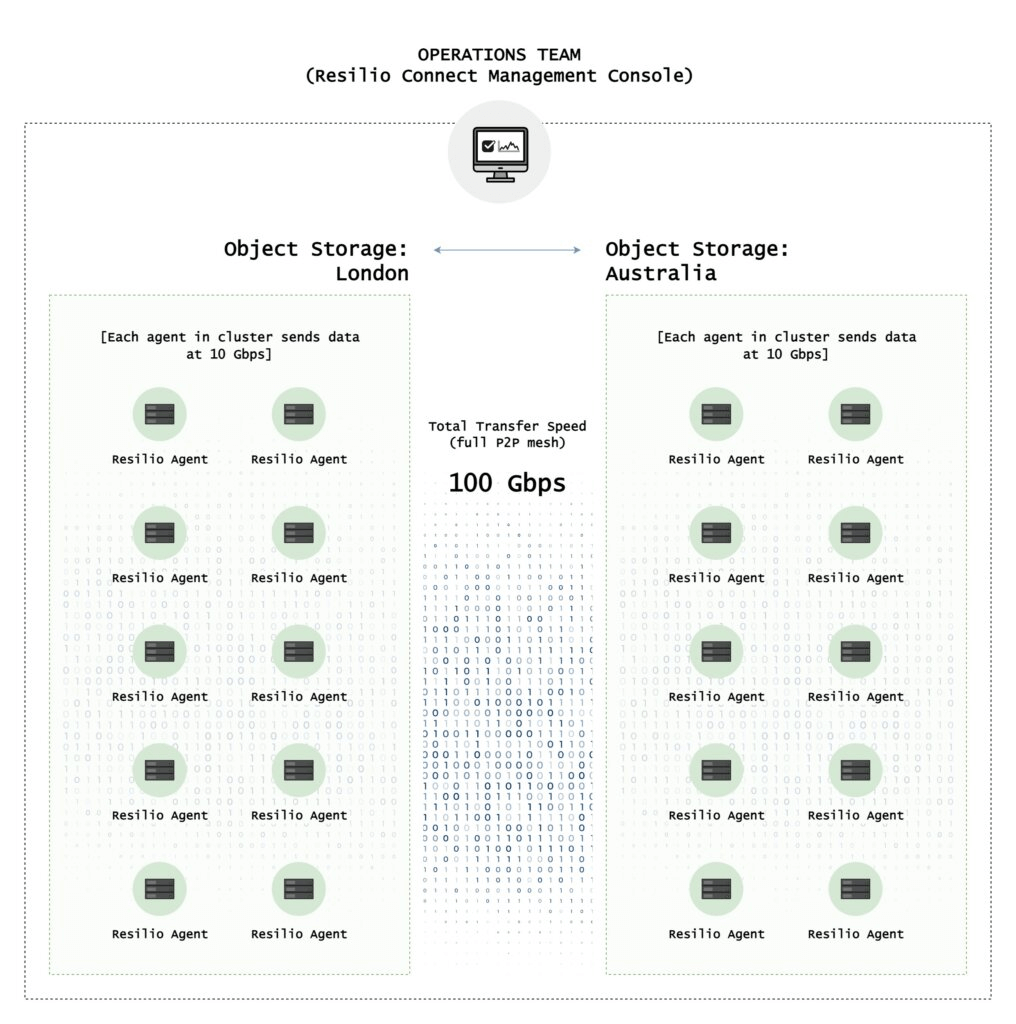
This also makes Resilio an organically scalable solution. The more endpoints you add, the more the speed and resources (CPU, bandwidth, and so on) of your environment are increased. In contrast, point-to-point solutions perform worse as you add more endpoints.
Finally, the P2P architecture makes Resilio incredibly resilient, as there’s no single point of failure. If any endpoint in your environment goes down, the required files or services can be retrieved from any other endpoint. Resilio also ensures bulletproof reliability via:
- Dynamic routing around outages and downed servers.
- Automatic retries. If a file transfer fails for any reason, Resilio automatically retries it until it is complete.
- Checkpoint restart. If a file transfer is interrupted, Resilio can perform a checksum restart to resume the transfer at the point of interruption.
Reliable Transfers over Any Network
Transferring files across large distances and spotty (WANs) wide area networks can lead to unpredictable transfer times, security concerns, and a plethora of other problems. Resilio helps you avoid those issues with Zero Gravity Transport™ (ZGT) — a highly-resilient, UDP-based WAN transport protocol.
ZGT intelligently analyzes the underlying conditions of a network (such as latency, loss, and throughput over time) and automatically adjusts to maintain a consistent speed, maximize network utilization, and adapt to conditions in real time.
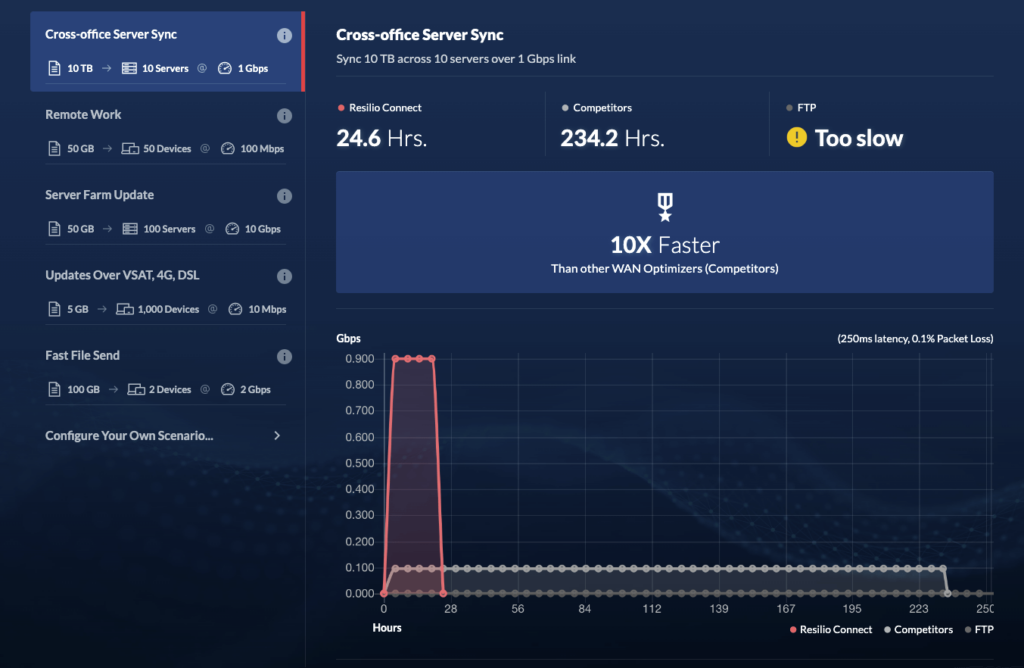
With ZGT, you can utilize any type of network connection, including VSAT, cell, Wi-Fi, and any IP connection. This makes ZGT invaluable when you need to transfer and sync data over intermittent, unreliable connections in reliable timeframes, which in turn makes Resilio a great choice for edge transfer use cases (like maritime file transfer and IoT data ingestion).
Built-In Security
With Resilio Connect, you don’t need VPNs or additional software to secure file transfers. Our solution comes with built-in security features, like:
- End-to-end encryption: Data is encrypted at rest and in transit using AES-256-bit encryption.
- Mutual authentication: Resilio requires each endpoint to provide an authentication key before initiating a transfer, ensuring your data is only delivered to approved endpoints.
- Forward secrecy: Sessions are protected with one-time session encryption keys.
- Cryptographic integrity validation: As mentioned earlier, file integrity is preserved with cryptographic validation.
- Immutable copies: Resilio stores immutable copies of files in the cloud to protect you in the event of ransomware.
- Proxy server: Resilio provides proxy and port-forwarding options that allow you to configure outbound connections and use a single IP address behind the corporate firewall, control programmatic access of specific systems/devices, control access to specific files/folders on your machines, provide end-users with more control over where/how data is stored, and more.
These and all other Resilio security features have been verified by 3rd-party experts to guarantee they’re up to the strictest data protection standards.
Versatile Deployment and File Access Options
Resilio is built on universal standards and open protocols. This means you can install Resilio agents directly onto your devices or virtual machines, and deploy it on your existing on-premise or hybrid/multi-cloud environments IT infrastructure.
Our solution supports just about any:
- Device, including desktops, laptops, file servers, NAS/DAS/SAN devices, IoT devices, mobile devices, and virtual machines.
- Operating system, including such as Microsoft Windows, MacOS, Linux, Unix, Ubuntu, FreeBSD, OpenBSD, and more.
- S3-compatible cloud object storage, including AWS S3, Google Cloud Platform, Azure, Wasabi, MinIO, Backblaze, and more.

This broad compatibility means that data exchanges can be automated between any endpoint within your existing infrastructure in a user-friendly fashion.
Finally, Resilio can also be used as an object storage gateway that provides low-latency access to files stored on premises or in any S3-compatible cloud object storage. This means you can streamline file access by letting people access files in a fast and efficient way, regardless of where they’re located.

2. IBM Aspera
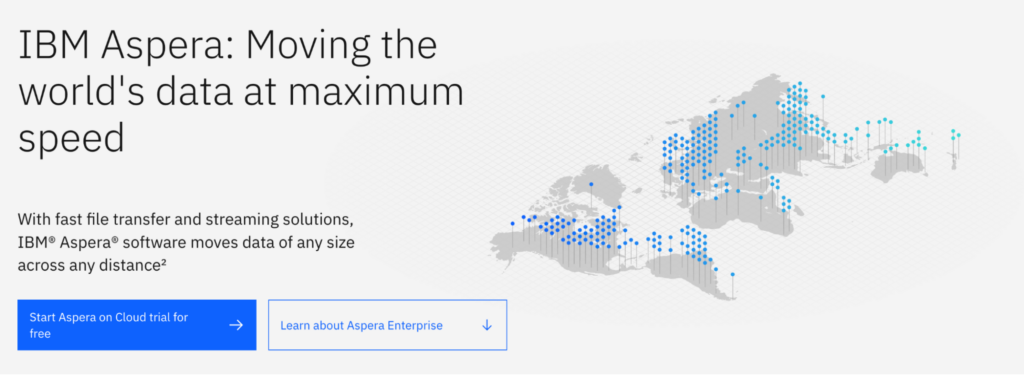
IBM Aspera offers data transfer, migration, and streaming services. Its underlying transport technologies remove bottlenecks and maximize speed by fully utilizing available bandwidth. Therefore, users can share large files globally; data migration supports on premises to cloud and on premises to onpremises, while their data delivery services support hybrid deployment.
Users can automate, monitor, and control their file transfer workflows using a combination of APIs and IBM’s library of hundreds of third-party plugins. Data is protected end-to-end with AES encryption, along with data integrity verification.
At the same time, Aspera isn’t the best choice for synchronizing or distributing files to several locations in real-time (and other sync use cases) due to its point-to-point architecture. You can learn more about this in our article on the 4 best IBM Aspera alternatives.
3. MASV
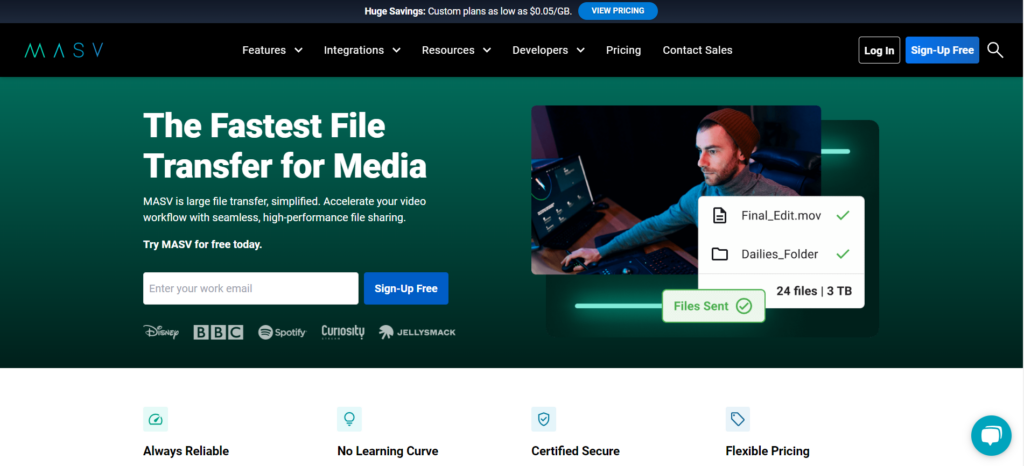
MASV is a fast file transfer solution for media companies. It achieves its fast upload and download speeds by optimizing bandwidth and removing bottlenecks in its global AWS infrastructure.
It can handle up to 15 terabyte files and hundreds of gigabytes for high-volume shares. Integrations include Frame.io, Amazon S3, Backblaze B2, Google Drive, Iconik, and Dropbox, with pricing based on downloads.
MASV also offers regulatory compliance with TPN, ISO, SOC2, GDPR, PIPEDA, and HIPAA. Security features include AES-256 encryption, Multi-Factor Authentication (MFA), Single-Sign-On (SSO), and user permissions and access controls.
MASV automates transfers via a system of folders, where users can monitor transfer status via a progress bar (which can help reduce human error).
4. MOVEit
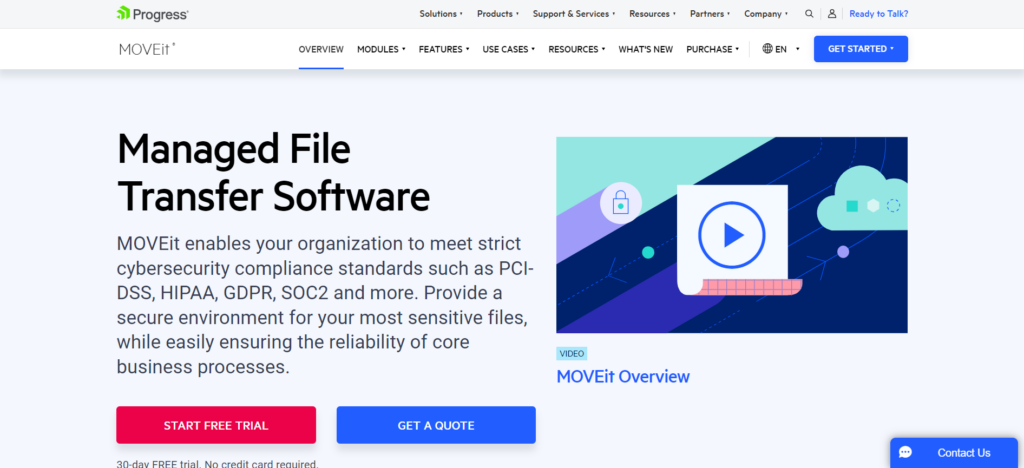
MOVEit is a solution that helps organizations with cybersecurity compliance requirements and standards such as PCI-DSS, HIPAA, GDPR, SOC2 and more. This solution actually consists of three different modules: MOVEit Transfer (on premises), Cloud (hosted by Progress), and Automation (works on premises, in the cloud, and in hybrid cloud scenarios).
MOVEit Automation, which is compatible with AWS S3 and Azure Blob, offers both scriptless options and REST APIs for scripts (REST, Java or .NET). Security features include PGP encryption of data at rest, transport encryption, and file integrity checks.
5. GoAnywhere MFT
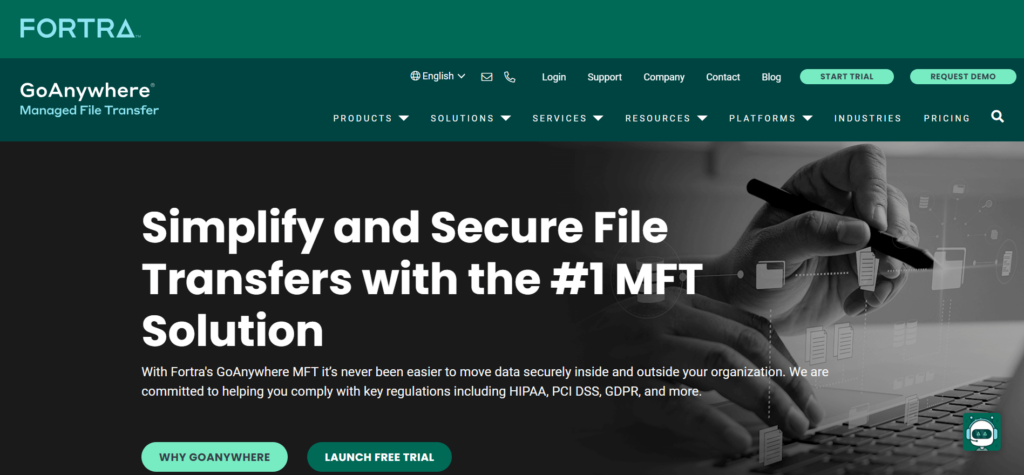
GoAnywhere is an managed file transfer solution (MFT) owned by Fortra. It includes features for:
- Automation: Users can automate 60+ task workflows via a built-in scheduler; commands and APIs for transfers from remote systems are also an option.
- Flexible deployment: Options for deployment include on premises, cloud, and hybrid cloud.
- Centralized management: GoAnywhere MFT has both browser and mobile functionality, allowing users to manage data movement from different devices. Users can also throttle bandwidth and accelerate transfers.
- Security: The solution uses an open PGP and GPG encryption standard. GoAnywhere also offers integrated tools for Open PGP keys, SSH keys and SSL/TLS certificates along with granular permissions and user authentication. It’s also well-suited for sensitive data like healthcare records or classified documents due to structural and document sanitization and other security features.
6. JSCAPE
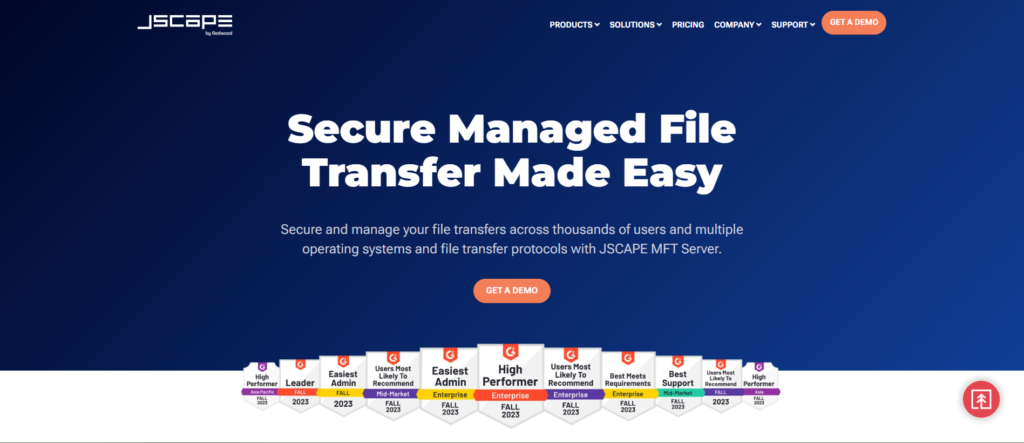
JSCAPE by Redwood is split into MFT Server, Gateway, and Monitor, which are accessed either via their web client or mobile app. The MFT subcategory includes what they describe as “high-availability, load balancing and passive-active servers.” In addition to their REST API, they offer JSCAPE Triggers to handle non-scripted automation.
They boast of any-size file sharing via a range of deployment options. JSCAPE can also handle on-premise, hybrid, private cloud, and SaaS environments. The solution is also capable of any-protocol transfers — AS2, SFTP, FTP/S, HTTP/S, OFTP2 and cloud-based.
Their security features include secure connections, network scanning, proxy servers, audit trails, data-in-motion via SSL or SSH, and more.
7. Cleo MFT
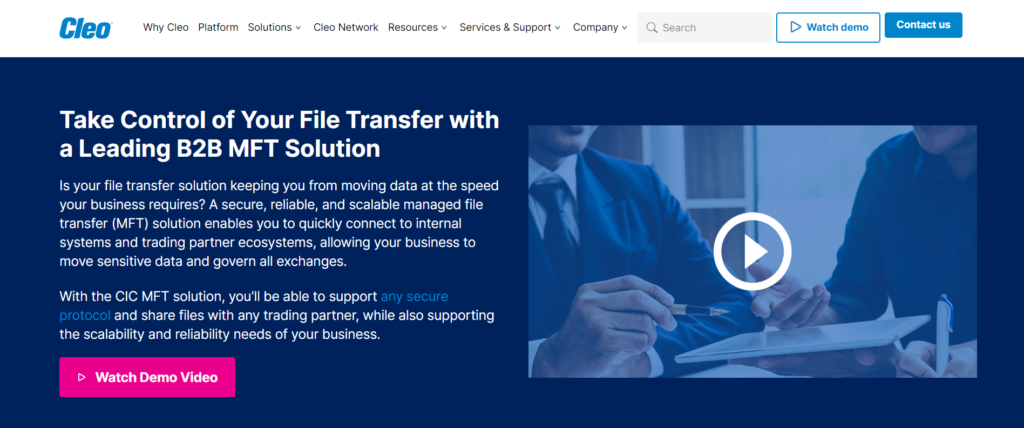
Cleo MFT offers both event-based and partner-based automation software, in which connections can be associated with trading partners to enable automatic actions and routing. It also enables automatic sync with monitoring options for disaster recovery scenarios.
Cleo MFT is compatible with Azure, S3, GCP, Database, Cloudera, JMSQueue, SMB, and NFS cloud storage options. It also offers a centralized management and reporting dashboard for handling sync jobs and file transfer activity.
Use Resilio for Fast, Reliable, and Automated File Transfers
Resilio Connect is an ideal automated file transfer solution because it:
- Is easy to manage and automate: You can use Resilio’s Management Console and REST API to set up and automate transfer and sync jobs based on your workflows and business needs. Our solution also lets you manage the process from one place, even in multi and hybrid cloud scenarios.
- Provides fast transfer speeds: Resilio’s P2P architecture enables it to transfer data 3-10x faster than traditional solutions. In large environments, Resilio has reached speeds of 100+ Gbps per cluster.
- Scales organically: There’s no limit to the number or size of files you can transfer and sync with Resilio. Thanks to its P2P architecture, Resilio can sync hundreds of endpoints in the same time it takes most solutions to sync just two. Plus, its performance only increases as you add more endpoints.
- Replicates in any direction: Resilio can sync files one-way, two-way, one-to-many, many-to-one, and N-way. This makes it a great choice for a variety of remote and hybrid work use cases, where files have to be synchronized in real-time behind the scenes.
- Can reliably transfer and sync files over any network: Resilio’s proprietary WAN acceleration protocol enables it to optimize transfers over any network, regardless of latency or quality.
- Syncs resiliently: Resilio retries transfers until they’re complete, resumes failed transfers at the point of failure, and dynamically routes around outages.
- Deploys on your existing infrastructure: You can deploy Resilio on your existing infrastructure and begin replicating in as little as two hours. It works with just about any device, cloud storage service, and operating system.
- Comes with built-in security features: Resilio includes native security features that protect your data at rest and in transit. There’s no need to invest in separate security software or a VPN.
To learn more about how Resilio can help you transfer and sync files of any size across any number of endpoints, schedule a demo with our team.





